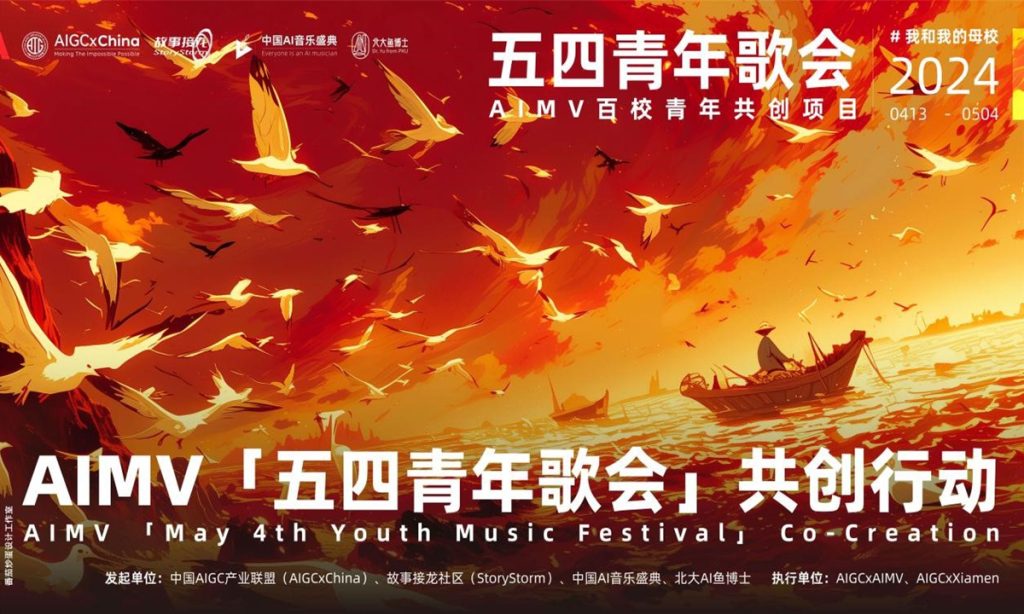100 plus Chinese universities celebrate May 4th with self-made AI songs

Students and alumni of more than 100 Chinese universities celebrated this year’s May 4th, known as Youth Day in China, by composing original songs using AI (artificial intelligence) technology.
Titled “The 1st China AIMV ‘May 4th Youth Music Festival’ Co-creation,” a non-profit music event was held online on Saturday night. The two-hour event mainly consisted of edited versions of some 120 songs about campus life and the spirit of youth.
Notably, the songs broadcast at the event were all made with AIGC (AI-generated content) tools such as the text-to-song generator Suno and the text-to-video model Sora, according to the event’s co-organizer China AIGC Industry Alliance (AIGCxChina), a nationwide civil group of industry insiders.
The youth-themed AI music co-creation event collected songs from universities across the country from April 14 to 30, said Chen Duo, a AIGCxChina member who initiated and directed the event.
The song collection period was short as it only takes a little time to make a song and a corresponding MV (music video) for the song with the help of AI technology, Chen said.
“Therefore, the event enabled young students to get closer to today’s AI tech, and provided them with a good opportunity to learn and make something themselves using AIGC tools - in a very short period of time,” Chen told the Global Times on Sunday.
Chen added that more than 60 percent of the participants were new to AIGC technology. To help them get started quickly, the event organizers shared a package of AIGC tools that every one could download for free, and Chen personally did six free online lectures in late April to teach people to use the tools.
Producing a song with AI tech is much easier than most people think, Chen said. He recalled that at the beginning of the song collection period, many participants experienced some anxiety and uncertainty.
“They thought of AIGC as a complex cutting-edge technology and assumed it would be difficult to learn, so they participated in the event out of pure curiosity,” Chen said. “They were not sure whether they could handle the tools and complete a song by themselves in just a few days.”
Echoing Chen’s words, Yang Ruxu, a Xiamen University (XMU) student majoring in piano performance, said that she had always cosidered AIGC tools to be very “high-end” and removed from ordinary people. During this music event however, she quickly got familiar with the tools and eventually contributed to three of the 10 songs that her university submitted.
“This event made me get closer to AI,” Yang told the Global Times.
Over 100 universities from the Chinese mainland, Hong Kong, Macao and Taiwan, Including XMU, submitted some 200 songs to the event organizers. The Saturday event broadcast 120 of them, attracting an audience of nearly 200,000 from home and abroad.
“I feel like the quality is high enough that it’s not distracting by the fact that it’s AI,so high that the audience is not at all distracted by the fact it’s AI-generated” commented Valentine, a Russian AI industry insider who lives in the US. “All the videos that we’ve seen really show the amount of work that went into them, and I think we can really congratulate all the students for their hard work, playing the game without holding anything back,” praised French music enthusiast Etienne.
Chen hopes the event will inspire more young Chinese to explore AIGC creation. “The original intention that we initiated this event is to promote the popularity of AIGC applications in China,” he told the Global Times. “I hope that young people, when faced with new concepts and technologies, will have the courage to face handle them.”
Althogh it is a novelty at present, AIGC tools are spreading rapidly and may become as common as Word and Excel in the near future, Chen predicted.